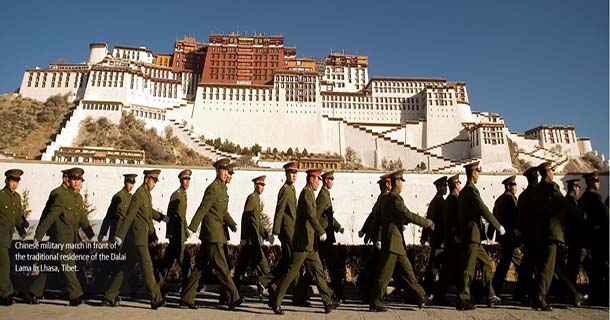
Chinese military march in front of the traditional residence of His Holiness the Dalai Lama
Photo: Bernado De Niz
The Chinese authorities are targeting suspected political dissidents and suppressing civil society initiatives in Tibetan areas, the human rights organisation Human Rights Watch (HRW) said in a report released on July 29. The authorities are even treating apparently non-political forms of social action as illegal.
The report, ‘Illegal Organisations’: China’s Crackdown on Tibetan Social Groups, reports how the Chinese Communist Party works to reduce the influence of lamas and traditional leaders.
“Police and Chinese Communist Party cadres already had virtually unlimited power over the daily lives of Tibetans,” said Sophie Richardson, China director at HRW. “But now authorities can prosecute people for simply gathering for any purpose not directly mandated or approved by the state.”
In February 2018, the Tibet Autonomous Region Public Security Bureau published a list of newly defined forms of “organised crime” in a circular. The banned activities include any initiatives for the promotion of local language and culture, and protection of the local environment, HRW reported.
HRW found that the criminalisation of innocuous forms of social activism has been official policy in some Tibetan areas since 2012. That policy accounts for numerous detentions and prosecutions of community activists, and closures of local schools and other self-help groups during this period.
HRW has called on the Chinese government, Party officials, and state security forces to immediately end their unjustified interventions into the creation and conduct of independent social associations in Tibetan communities.
They have appealed to governments and United Nations bodies to publicly call on China’s leaders to reconcile the laws and policies restricting the rights to freedom of expression, peaceful assembly, and association with their claims to respect the rule of law. These concerns should also be expressed at China’s review under the International Convention on the Elimination of All Forms of Racial Discrimination at the UN in August 2018.
“Beijing repeatedly claims that Tibetans have autonomy and their rights as an ethnic minority are respected,” said Ms Richardson, “But the realities show only increasing repression of Tibetans’ daily lives and basic human rights.”




 Print
Print Email
Email